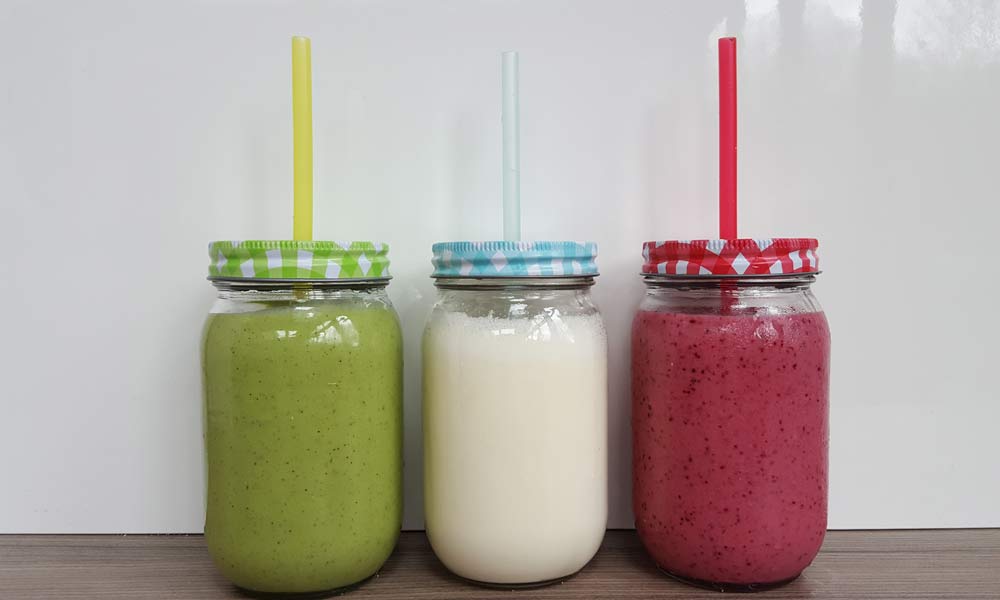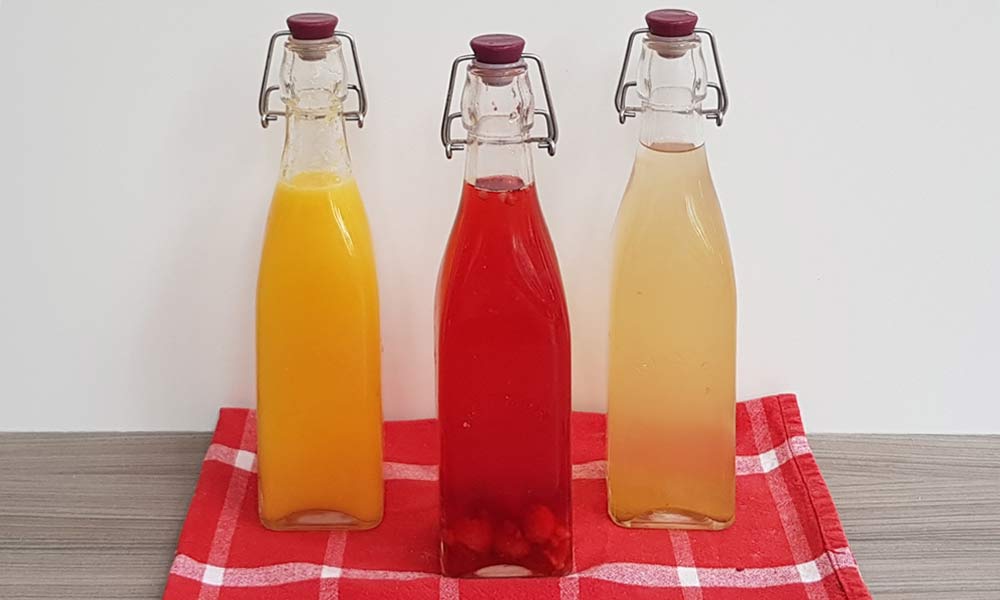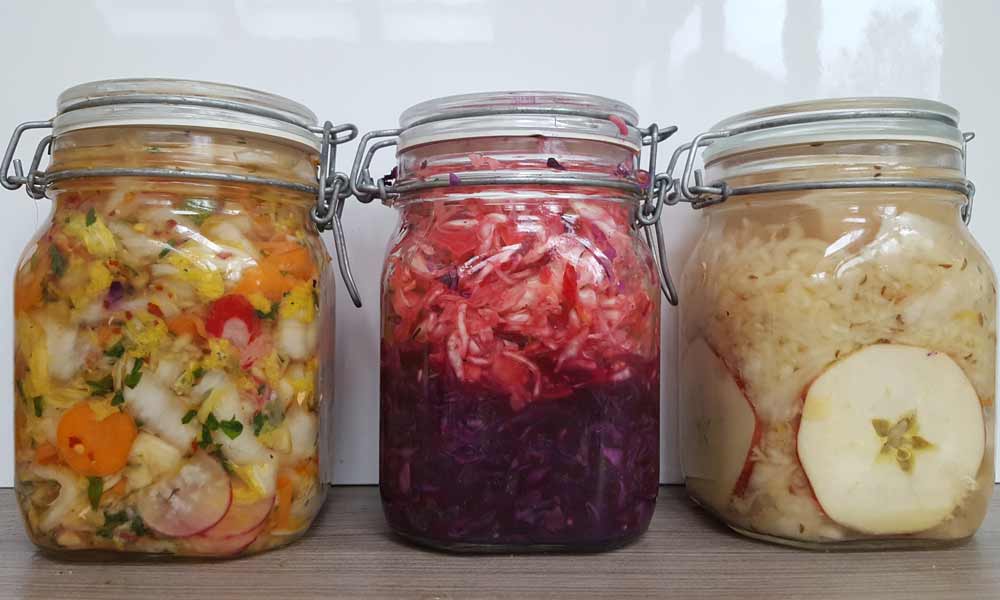MILK KEFIR
Is tangy, slightly fizzy, FANTASTIC fermented milk drink with a high source of probiotics. It looks similar to yogurt, but it’s far more superior. It has over 40 strains of good bacteria and yeasts whereas yogurt has 7 – 10. Yogurt will stay a day inside of you for 24hours, but Kefir will stay indefinitely. It builds colonies of good bacteria in your gut to perform important tasks every day.

- High in nutrients and probiotics
- Rich in enzymes that help us digest our food
- Increases healthy micro flora in gut
- Rich in protein ,Vitamin B-12 and Vitamin C and Vitamin K
- Contains an abundance of calcium and magnesium which are supportive to a healthy nervous system
- Kefir contains lactic acid, which is good for healthy skin
- Kefir almost completely eliminates lactose. Often those who have trouble with lactose can handle Kefir
- 1 cup provides 25% of daily amount of Vitamin D you need
Fermentation breaks down casein or milk protein one of the most difficult proteins to digest. Culturing restores many of the enzymes destroyed by pasteurisation. These enzymes help to digest lactose or milk sugar, and also help the body absorb calcium and minerals.
Kefir is incredibly easy to make at home and can be flavoured just like yogurt it is also incredibly versatile so it can be used in baking, for salad dressings, smoothies, sourdough, cottage cheese, sour cream and much more.
Kefir can be made from cows or goats milk and non-dairy Kefir from coconut or any nut milk.
- Eases constipation
- Reduces or eliminates allergies and asthma symptoms
- Enhanced digestion
- Reduces or eliminates cold and flu symptoms
- Helps with acne
- Treats yeast infections
- Acts as a strong, natural antibiotics
- Helps balance blood sugar
- Lowers blood pressure
- Supports immune system
- Helps with Lactose intolerance
- Eliminates acid reflux
- Promotes deep sleep
- Heals ulcers

Petra Lewis
Hi my name is Petra Lewis and I am a personal trainer and fitness professional with a passion for nutrition. January 2016 I was introduced to the incredible world of food fermentation.
Workshops
Book my place
WATER KEFIR
A delicious fruit infused bubbly water full of incredibly healthy bacteria and probiotics, that heals the gut, clears the skin and energises the whole body.
You can flavour it with different fruits and spices to create fizzy and refreshing drink. This make it healthy alternative to sugary fizzy drinks.
It’s made with water grains that consumes the sugar in the sugared water to create lots of probiotics.
A dairy free alternative to milk Kefir.

KOMBUCHA
Fermented black or green tea that creates slightly fizzy, delicious tart drink.Similar taste to sparkling apple cider. It’s very good detoxifier due to its glucoronic acid. When toxins enters the liver, this acid binds them and flushes them away through the kidneys. Therefore Kombucha is a powerful aid to the body’s natural cleansing process and a boost to the immune system.
It helps with weight loss, allergies, boosts immunity, fights yeast infections, helps with join problems and digestion.
It can be flavoured with different fruits and juices.
- Assists the liver cleansing and detoxifying
- Helps with weight loss
- Supports the immune system
- Boosts energy
- Prevents kidney stones
- Protects the lining of the stomach
- Has antibiotics resistant probiotic yeast

FERMENTED VEGETEBLES
Lacto-fermentation is a type of preservation where good bacteria found naturally on vegetables, converts the starches and sugars into lactic acid that inhibits the growth of harmful bacteria and helps the good bacteria to thrive, thus creating a powerful probiotic. It can remove pesticides and harmful chemicals in the vegetables themselves.
The enhanced probiotics, enzymes, and vitamins in fermented vegetables make them powerhouse food.
Lactic acid activates enzymes in the vegetable that aid digestion, and it unlock a bunch of vitamins, including Vitamin C and Vitamin A as well as the much-reverted Vitamin K2- a known cancer fighter. One cup of cabbage has 30mg of Vitamin C when you make a Sauerkraut from it will increase Vitamin C to 700mg per cup.
Among many other nutrients critical for body’s well-being are B12 and folate. Vitamin B12 is difficult to come by for people on a strict vegetarian or vegan diet, as it’s present only in animal-based foods. Fermented vegetables, however, contain Vitamin B12.
It promotes the growth of healthy gut flora.
It reduces sugar cravings – scientists have found that gut bacteria actually secretes special proteins that are similar to hunger- regularly hormones, affecting both our food cravings and mood. In other words, the little buggers try to get us to eat foods that they thrive on. So if you eat lots of sugar, you feed the bacteria that love it, locking yourself into the craving cycle. Eating fermented food, however, amps up the healthy bacteria, overpowering sugar- lovingmicrobes and weakening the craving signals.
- Stops diarrhoea and constipation
- Helps with weight loss
- Reduce or eliminates allergies
- Reduce inflammation
- Helps to ease the symptoms of bowel disease
- Combat colds and flu
- Alleviate the symptoms of food poisoning–simply take one spoonful of juice from your fermented vegetables every hour to help you speed up your recovery

SOURDOUGH BREAD
Unlike the other cultures I covered earlier, the Sourdough bread isn’t necessary living probiotic as the heat kills the beneficial bacteria. However the good bacteria ( lactobacilli) transform the bread through fermentation prior to baking. The Fermentation process has already developed many vitamins and minerals that aren’t around in regular grain. It also alters the structure of the grains so that they’re more easily digested.
A diet high in unfermented whole grain, particularly high-gluten grains like wheat, put enormous strain on the whole digestive mechanism. When this mechanism breaks down with age or overuse, results take the form of allergies, celiac disease, chronic indigestion ect. During the process of soaking and fermenting, gluten and other difficult-to-digest proteins are partially broken down into simpler components that are more readily absorbed.
